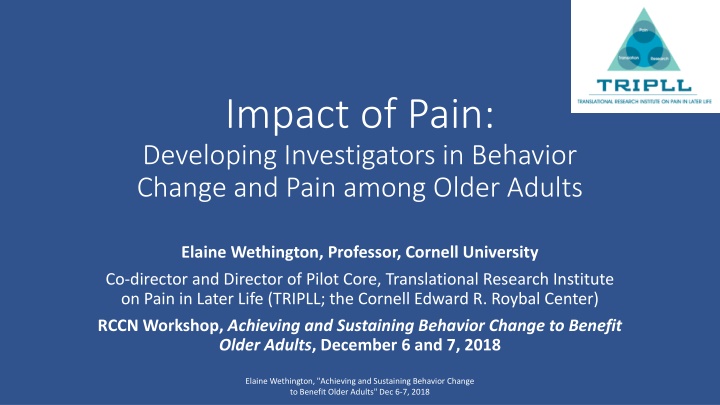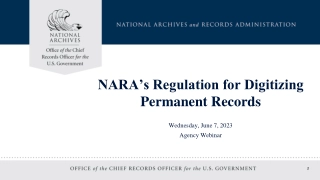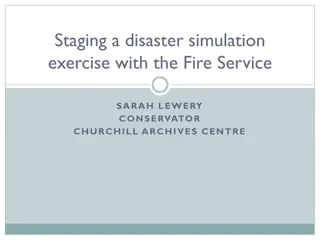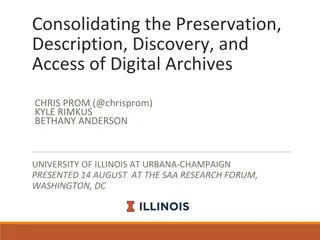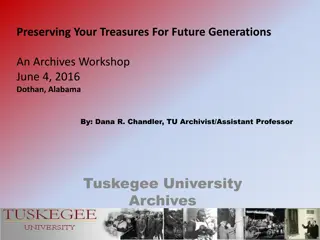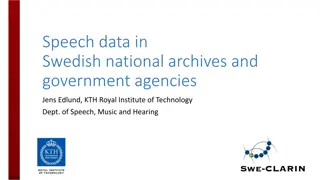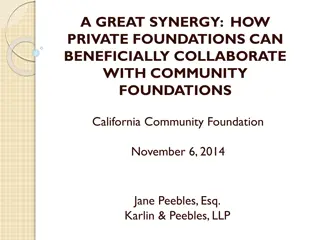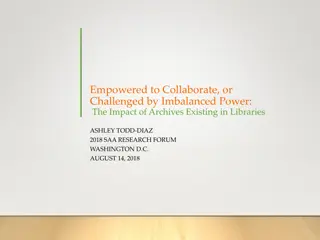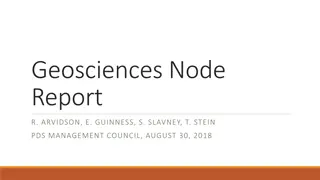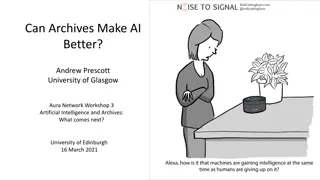Digitizing Oakwood's Archives - Building Foundations
Putting in place a structure for the digitization of Oakwood University's archives, exploring the why, what, and how of the project. Covering stakeholders, commitment, change models, unmet goals, and more. Acknowledging the contributions of key individuals and teams involved in this initiative. Delving into the advantages and disadvantages of digitization, highlighting the benefits of improved access and convenience alongside potential challenges.
Download Presentation

Please find below an Image/Link to download the presentation.
The content on the website is provided AS IS for your information and personal use only. It may not be sold, licensed, or shared on other websites without obtaining consent from the author.If you encounter any issues during the download, it is possible that the publisher has removed the file from their server.
You are allowed to download the files provided on this website for personal or commercial use, subject to the condition that they are used lawfully. All files are the property of their respective owners.
The content on the website is provided AS IS for your information and personal use only. It may not be sold, licensed, or shared on other websites without obtaining consent from the author.
E N D
Presentation Transcript
Impact of Pain: Developing Investigators in Behavior Change and Pain among Older Adults Elaine Wethington, Professor, Cornell University Co-director and Director of Pilot Core, Translational Research Institute on Pain in Later Life (TRIPLL; the Cornell Edward R. Roybal Center) RCCN Workshop, Achieving and Sustaining Behavior Change to Benefit Older Adults, December 6 and 7, 2018 Elaine Wethington, "Achieving and Sustaining Behavior Change to Benefit Older Adults" Dec 6-7, 2018
Significance Over 100 million Americans are affected by chronic pain Prevalence studies indicate that as many as 50 percent of older adults report experiencing bothersome pain on a regular basis Pain is under-recognized and under-treated among older adults and there are significant disparities in treatment Elaine Wethington, "Achieving and Sustaining Behavior Change to Benefit Older Adults" Dec 6-7, 2018
One in three Part D Medicare beneficiaries received an opioid prescription in 2016 (US DHHS Office of Inspector General. Opioids in Medicare Part D: Concerns about extreme use and questionable prescribing. https://oig.hhs.gov/oei/reports/oei-02-17-00250.pdf) Given current opioid crisis, there is a need for non-pharmacological treatment of chronic pain, however . Current behavioral approaches show limited effectiveness Small treatment benefits for only a limited amount of time Most of the behavioral mechanisms that would sustain change over time are unknown Elaine Wethington, "Achieving and Sustaining Behavior Change to Benefit Older Adults" Dec 6-7, 2018
Aims of TRIPLL (Cornell Roybal Center) Develop potent and scalable behavioral interventions to address the problem of later-life pain Conduct an investigator development program in this area (train a new generation) Provide an effective infrastructure for developing behavioral interventions using new technologies that can enhance intervention effects Multi-disciplinary (geriatrics; S/B science; information science) Incorporate latest technologies and methodologies Elaine Wethington, "Achieving and Sustaining Behavior Change to Benefit Older Adults" Dec 6-7, 2018
Significant Gaps in Research in Behavior Change and Pain among Older Adults Important groups under-represented in pain research Persons with cognitive impairment Rural aging adults Minorities Aging with HIV Elaine Wethington, "Achieving and Sustaining Behavior Change to Benefit Older Adults" Dec 6-7, 2018
Behavior change science is not yet well- utilized in pain research Areas where TRIPLL investigators are currently working Basic science: e.g. Living with pain leads to drain on self-regulatory resources Community-based feasibility studies: e.g. The capacity and sustainability of behavior change is affected by stress reactivity, stress recovery, and resources for resilience Feasibility studies in palliative care: e.g. Interpersonal and social resources; sustainable behavior change is embedded in social relationships Elaine Wethington, "Achieving and Sustaining Behavior Change to Benefit Older Adults" Dec 6-7, 2018
Developing a Research Agenda in mHealth Applications for Pain in Older Adults Significance: mHealth has had limited reach and impact in pain care Process: develop research priorities in the area of mHealth and later- life pain derived from the joint perspectives of researchers and key stakeholder groups who met in a consensus conference setting 60 participants: Researchers, practitioners, pain experts, technology researchers, patients with pain and caregivers (April 2017) Wethington et al., Establishing a research agenda on mobile health technologies and later-life pain usijng an evidence-based consensus workshop approach. Journal of Pain, 2018 (available online at www.jpain.org) Elaine Wethington, "Achieving and Sustaining Behavior Change to Benefit Older Adults" Dec 6-7, 2018
Recommendations 95 recommendations generated using a face-to-face group discussion process 24 themes organized on-site experts from the 95 recommendations 24 themes were presented for endorsement at the conference (each participant had 10 votes to distribute) Themes further reduced in number and presented to participants for their comments Elaine Wethington, "Achieving and Sustaining Behavior Change to Benefit Older Adults" Dec 6-7, 2018
Thirteen Recommendations Grouped into Two Larger Categories Implications for research design (the majority of the endorsements) E.g., emphasize diverse audiences, impact on mental health, personalization to individual circumstances, expand implementation of sensing in addition to self-reports Implementation into practice (and regulatory issues) E.g. improve communication with health providers, privacy and data use concerns, integration into existing health care systems Elaine Wethington, "Achieving and Sustaining Behavior Change to Benefit Older Adults" Dec 6-7, 2018
Important Topical Themes and Concerns The need for inclusion (economic; cultural) Tailor device use to older adults and their changing needs over time Establish real world validity as quickly as possible Major concern expressed by patients and providers: adoption of mHealth might isolate older patients from their providers and lead to less personalized care mHealth should add VALUE to care that is already being delivered, rather than displace hands-on care Privacy and security of health information is crucial for winning the trust of older patients Elaine Wethington, "Achieving and Sustaining Behavior Change to Benefit Older Adults" Dec 6-7, 2018
MyBehavior* Reluctance to engage in physical activity is common due to negative psychological reactions (e.g. fear of injury) Mobile phone app that uses machine learning based on sensor and self- report data to detect routines and make personalized recommendations Small study of 10 adults with back pain, 5 week period (control was generic recommendations from experts) MyBehavior generated recommendations were rated as more feasible, and were more actualized in physical activity *Rabbi, M. et al. Feasibility and acceptability of mobile phone-based auto-personalized physical activity recommendations for chronic pain self-management: Pilot study on adults. Journal of Medical Internet Research, 2018 Elaine Wethington, "Achieving and Sustaining Behavior Change to Benefit Older Adults" Dec 6-7, 2018
Limbr* Implemented evidence-based tutorials, sensing, self-report tools, remote health coach support, and activity tracking into one app Single-arm trial, convenience sample of 93 adults enrolled in 3-month physical activity program Assessed patient engagement and patient evaluation of program utility Users found the system easy to use, were positive about interactions with the app (clinical outcomes were not assessed) *Selter, A. et al. An mHealth app for self-management of chronic lower back pain (Limbr): Pilot study. JMIR Mhealth and Uhealth. 2018:6(9):e179. Elaine Wethington, "Achieving and Sustaining Behavior Change to Benefit Older Adults" Dec 6-7, 2018
Acknowledgements NIA R13 AG053044-01 NIA 3 P30 AG022845-15 NIA 1 T32 AG049666 Cary Reid, MD Karl Pillemer, PhD Corinna Loeckenhoff, PhD Jeanne Teresi, PhD Mildred Ramirez, PhD Geri Gay, PhD Laura Meador, MPH Weill Cornell Medicine Cornell University-Ithaca Cornell Tech Elaine Wethington, "Achieving and Sustaining Behavior Change to Benefit Older Adults" Dec 6-7, 2018
Thank you! Elaine Wethington, "Achieving and Sustaining Behavior Change to Benefit Older Adults" Dec 6-7, 2018
